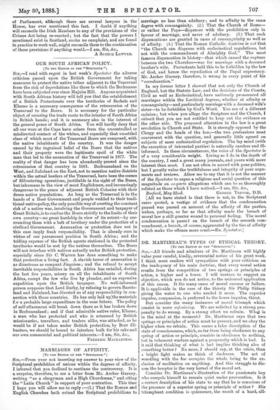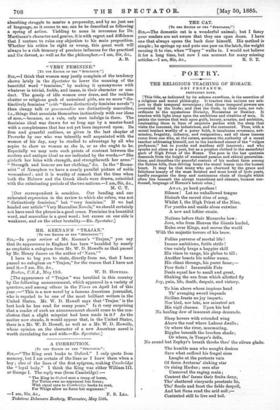DR. MARTINEAU'S TYPES OF ETHICAL THEORY. [To THE EDITOR OF THE "SPECTATOR?'
Sin,—All friends and admirers of Dr. Martineau will highly value your careful, kindly, reverential notice of his great work. I think most readers will sympathise with your criticism on the inadequacy of his main doctrine, that every moral action results from the competition of two springs or principles of action, a higher and a lower. I will venture to suggest an objection, which you do not notice, to the universal application of this canon. It fits many cases of moral success or failure. It is applicable in the case of the thirsty Sir Philip Sidney giving the water to one who needed it more. The superior impulse, compassion, is preferred to the lower impulse, thirst.
But consider the many instances of moral triumph which consist in mere refraining. We are solicited by a strong propensity to do wrong. By a strong effort we refrain. What is in the mind at the moment? Dr. Martineau says that two springs or principles of action must be present, and we obey the higher when we refrain. This seems a false description of the state of consciousness, which, so far from being obedience to any spring of action or principle, consists in obedience to nothing, but in vehement warfare against a propensity which is bad. Is it said that thinking of what is bad implies thinking also of something better ? No more, I should say, at the crisis, than a bright light makes us think of darkness. The act of wrestling with the foe occupies the whole being to the exclusion of meditation on anything. And this struggle to disarm the tempter is the very kernel of the moral act.
Consider Dr. Martinean's illustration of the passionate boy who compels himself to remain quiet under provocation. Is it a correct description of his state to say that he is conscious of the presence of a superior spring or principle of action ? His triumphant condition is quiescence, the result of a hard, all
absorbing struggle to master a propensity, and by no just use of language, as it seems to me, can be be described as following a spring of action. Yielding to none in reverence for Dr. liartineau's character and genius, it is with regret and diffidence that I venture to raise any objection to his main proposition. Whether his critics be right or wrong, this great work will always be a rich treasury of precious influence for the practical and the devout, as well as for the philosopher.—I am, Sir, &c., A. B.















































 Previous page
Previous page